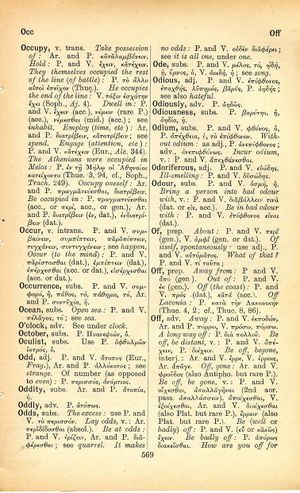off: Difference between revisions
οὗτος ὁ υἱός μου νεκρὸς ἦν καὶ ἀνέζησεν, ἦν ἀπολωλὼς καὶ εὑρέθη → This son of mine was dead and has come back to life. He was lost and he's been found.
(CSV4) |
m (Text replacement - "<b class="b2">and</b>" to "and") |
||
| Line 19: | Line 19: | ||
<b class="b2">Cut off</b>: lit., P. and V. τέμνειν, κόπτειν, Ar. and P. ἀποτέμνειν, V. θερίζειν, ἀπαμᾶν; see under [[cut]]. | <b class="b2">Cut off</b>: lit., P. and V. τέμνειν, κόπτειν, Ar. and P. ἀποτέμνειν, V. θερίζειν, ἀπαμᾶν; see under [[cut]]. | ||
<b class="b2">Intercept</b>: P. ἀπολαμβάνειν, διαλαμβάνειν. | <b class="b2">Intercept</b>: P. ἀπολαμβάνειν, διαλαμβάνειν. | ||
<b class="b2">Destroy</b>: P. | <b class="b2">Destroy</b>: P. and καθαιρεῖν; see [[destroy]]. | ||
<b class="b2">Get off</b>: see [[escape]]. | <b class="b2">Get off</b>: see [[escape]]. | ||
<b class="b2">Be acquitted</b>: P. and V. [[φεύγω|φεύγειν]], σώζεσθαι, Ar. and P. ἀποφεύγειν. | <b class="b2">Be acquitted</b>: P. and V. [[φεύγω|φεύγειν]], σώζεσθαι, Ar. and P. ἀποφεύγειν. | ||
Revision as of 17:56, 24 February 2019
English > Greek (Woodhouse)
prep.
Away from: P. and V. ἀπό (gen). Out of: P. and V. ἐκ (gen.). Off (the coast): P. and V. πρός .(dat.), κατά (acc.). Off Laconia: P. κατὰ τὴν Λακωνικήν (Thuc. 4, 2; cf., Thuc. 8, 86). adv. Away: P. and V. ἐκποδών, Ar. and P. πόρρω, V. πρόσω, πόρσω. A long way off: P. διὰ πολλοῦ. Be off, be distant, v.: P. and V. ἀπέχειν, P. διέχειν. Be off, begone, interj.: Ar. and V. ἔρρε, V. ἔρροις, Ar. ἄπαγε. Off, gone: Ar. and V. φροῦδος (also Antipho. but rare P.). Be off, be gone, v.: P. and V. οἴχεσθαι, ἀπαλλαγῆναι (2nd aor. pass. ἀπαλλάσσειν), ἀποίχεσθαι, V. ἐξοίχεσθαι, Ar. and V. διοίχεσθαι (also Plat. but rare P.), ἔρρειν (also Plat. But rare P.). Be (well or badly) off: P. and V. (εὖ or κακῶς) ἔχειν. Be badly off: P. ἀπόρως διακεῖσθαι. How are you off for friends: V. πῶς δʼ εὐμενείας (gen. sing.) . . . ἔχεις; (Eur., Hel. 313). Come off, v.: see occur. Of a person, come off (better or worse): P. and V. ἀπαλλάσσειν. Cut off: lit., P. and V. τέμνειν, κόπτειν, Ar. and P. ἀποτέμνειν, V. θερίζειν, ἀπαμᾶν; see under cut. Intercept: P. ἀπολαμβάνειν, διαλαμβάνειν. Destroy: P. and καθαιρεῖν; see destroy. Get off: see escape. Be acquitted: P. and V. φεύγειν, σώζεσθαι, Ar. and P. ἀποφεύγειν. Keep off, ward off: P. and V. ἀμύνειν; see ward off. Refrain: P. and V. ἀπέχειν. Lie off, of a ship: P. ἐφορμεῖν (dat.); of an island: P. ἐπικεῖσθαι (dat. or absol.). Make off, run away: Ar. and P. ἀποδιδράσκειν. Put off, defer: P. and V. ἀποτίθεσθαι, εἰς αὖθις ἀναβάλλεσθαι; see under put. Take off (clothes, etc.): P. and V. ἐκδύειν, Ar. and P. ἀποδύειν. Take off from oneself: use mid. of verbs given. Parody: Ar. and P. κωμῳδεῖν (acc.).

